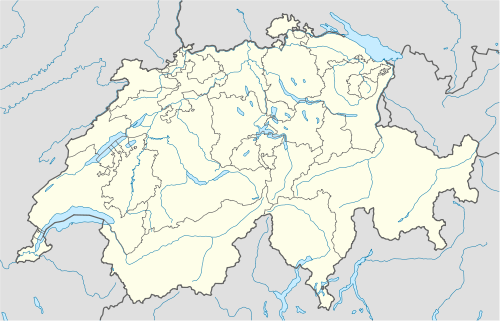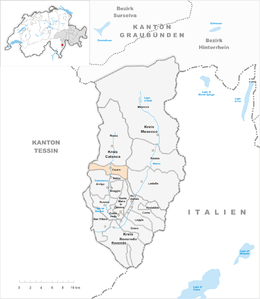Cauco
| Cauco | ||
|---|---|---|
| Former municipality of Switzerland | ||
|
| ||
| ||
 Cauco | ||
|
Location of Cauco  | ||
| Coordinates: 46°20′N 9°7′E / 46.333°N 9.117°ECoordinates: 46°20′N 9°7′E / 46.333°N 9.117°E | ||
| Country | Switzerland | |
| Canton | Graubünden | |
| District | Moesa | |
| Area | ||
| • Total | 10.89 km2 (4.20 sq mi) | |
| Elevation | 992 m (3,255 ft) | |
| Population (Dec 2013) | ||
| • Total | 35 | |
| • Density | 3.2/km2 (8.3/sq mi) | |
| Postal code | 6546 | |
| SFOS number | 3806 | |
| Localities | Cauco, Bodio, Lasciallo, Masciadone | |
| Surrounded by | Arvigo, Biasca (TI), Lostallo, Osogna (GR), Rossa, Santa Maria in Calanca, Selma, Soazza, Verdabbio | |
| Website |
cauco SFSO statistics | |
Cauco is a former municipality in the district of Moesa in the Swiss canton of Graubünden. On 1 January 2015 the former municipalities of Arvigo, Braggio, Cauco and Selma merged to form the new municipality of Calanca.[1]
History
The church at Cauco is first mentioned in 1497. The village was part of the Squadra di Calanca until 1851 when it became an independent municipality.[2]
Geography
Before the merger, Cauco had a total area of 10.9 km2 (4.2 sq mi).[3] Of this area, 8.8% is used for agricultural purposes, while 49.5% is forested. Of the rest of the land, 1.6% is settled (buildings or roads) and the remainder (40.1%) is non-productive (rivers, glaciers or mountains).[3]
The former municipality is located in the Calanca sub-district of the Moesa district. It is located on the left bank of the Calancasca river at an elevation of 1,132 meters (3,714 ft). It is on a scree slope from a prehistoric rock slide. It consists of the village of Cauco and the hamlets of Lasciallo, Masciadone and Bodio (GR).
Demographics
Cauco had a population (as of 2013) of 35.[3] As of 2008, 2.8% of the population was made up of foreign nationals.[4] Over the last 10 years the population has decreased at a rate of -4.9%. Most of the population (as of 2000) speaks Italian (73.0%), with German being second most common (24.3%) and French being third ( 2.7%).[3]
As of 2000, the gender distribution of the population was 51.3% male and 48.7% female.[5] The age distribution, as of 2000, in Cauco is; 1 child is between 0 and 9 years old. There are no teenagers who are 10 to 14, and 4 teenagers or 10.8% of the population who are 15 to 19. Of the adult population, 3 people or 8.1% of the population are between 20 to 29 years old. 4 people or 10.8% are 30 to 39, 3 people or 8.1% are 40 to 49, and 6 people or 16.2% are 50 to 59. The senior population distribution is 5 people or 13.5% of the population are between 60 to 69 years old, 6 people or 16.2% are 70 to 79, there are 4 people or 10.8% who are 80 to 89, and there is 1 person who is 90 to 99.[4]
In the 2007 federal election the most popular party was the SP which received 48.6% of the vote. The next three most popular parties were the CVP (22.9%), the SVP (20%) and the FDP (6.7%).[3]
The entire Swiss population is generally well educated. In Cauco about 76.4% of the population (between age 25-64) have completed either non-mandatory upper secondary education or additional higher education (either University or a Fachhochschule).[3]
Cauco has an unemployment rate of 1.19%. As of 2005, there were 8 people employed in the primary economic sector and about 3 businesses involved in this sector. 3 people are employed in the secondary sector and there is 1 business in this sector. 2 people are employed in the tertiary sector, with 1 business in this sector.[3]
The historical population is given in the following table:[2]
| year | population |
|---|---|
| 1683 | c. 400 |
| 1803 | 149 |
| 1850 | 120 |
| 1950 | 92 |
| 1990 | 30 |
| 2000 | 37 |
Notable people
- Roger Sablonier (1941–2010), Swiss historian and writer, University of Zürich faculty
References
- ↑ Amtliches Gemeindeverzeichnis der Schweiz published by the Swiss Federal Statistical Office (German) accessed 2 January 2013
- ↑ 2.0 2.1 Cauco in German, French and Italian in the online Historical Dictionary of Switzerland.
- ↑ 3.0 3.1 3.2 3.3 3.4 3.5 3.6 Swiss Federal Statistical Office accessed 19 January 2015
- ↑ 4.0 4.1 Graubunden Population Statistics (German) accessed 21 September 2009
- ↑ Graubunden in Numbers (German) accessed 21 September 2009
| Wikimedia Commons has media related to Cauco. |
External links
- Official website (Italian)
- Cauco in German, French and Italian in the online Historical Dictionary of Switzerland.
